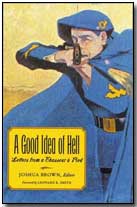Feature Articles - A Good Idea of Hell
 A Good Idea of Hell:
Letters from a Chasseur à Pied is a new book from Texas A&M University
Press, #83 in its Military History series. It received the 2004
Distinguished Book Award for best memoir from the Society for Military
History.
A Good Idea of Hell:
Letters from a Chasseur à Pied is a new book from Texas A&M University
Press, #83 in its Military History series. It received the 2004
Distinguished Book Award for best memoir from the Society for Military
History.
Robert Pellissier, the author of the letters, spent most of the war in the French army, stationed in the Vosges Mountains in Alsace overlooking the Rhine.
He was born in France and came to the U.S. as a boy of 14 to live with his sister, who was the editor's great-grandmother. He received his Ph.D. from Harvard, and taught at Stanford from 1911 to 1914 as Assistant Professor of Romance Languages.
When the First World War broke out, he returned to France and volunteered as an enlisted man in the 5th battalion of the elite chasseurs à pied. He wrote letters to his family in Brooklyn, to his fiancée, and to friends and colleagues for two years, until he was killed at the battle of the Somme.
The letters are factual, filled with dry humour, comments on European and American politics, notes about wartime prices and social conditions, the military situation, observations on the French character, and the ribald opinions of his fellow soldiers.
The letters are interspersed with selections from his diary, which give his own unglossed, private version of events, in contrast to the more cheerful letters he sent home to his young nieces in Brooklyn.
Robert Pellissier realised within the first few weeks that the war would turn into a bloody stalemate. He hated the senseless slaughter and the calculated cruelties of the new style of mechanized war.
At the same time, he refused to give in to the propaganda caricatures of the Germans. He distinguished clearly between German militarism, which he despised, and the main stream of German culture, which he knew thoroughly and admired.
Most of the English-language books of letters from WWI which are currently available are written by British or American soldiers. Robert Pellissier's letters are unique in that they were written in excellent English by a native French speaker, who had a complete understanding of both French and American cultures.
They also cover an area of the front which has not received much attention. He describes in detail his part in the see-saw battles for Mulhouse in the opening weeks of the war, and he spent 53 days under siege on the Hartmannweilerskopf, where the constant bombardment made it impossible for his unit to be relieved.
Not as well-known today as major battles like Verdun and the Somme, the battle for the Hartmannweilerskopf was front-page news at the time.
He was wounded and spent some months in hospital, after which he was judged unfit to carry the heavy backpack of the ordinary soldier. After a short spell of liaison/translation work, he was sent to St.-Maixent for officer training. The competition there was very keen, and most of his fellow candidates were much younger, so he was passed out of St.-Maixent as a sergeant.
He returned to the Vosges and spent several months up near Munster/Colmar, before being drafted up to the Somme, where he was killed. His final letters were written only hours before his death.
This new edition of the letters includes footnotes for all of the many contemporary references and translations of the hundreds of French phrases and literary allusions which are salted throughout the original manuscript. It also includes a time line, an index of place names, letters which were sent home by the military chaplain after Pellissier's death, and eulogies written by his colleagues and his sister, plus maps and photographs of him both in uniform and in civilian clothes.
The editor of the letters, Joshua Brown, lives and works in Richmond, Indiana.
A Good Idea of Hell: Letters from a
Chasseur à Pied
Edited by Joshua Brown
Foreword by Leonard Smith, professor of history at Oberlin College
(2003: Texas A&M University Press)
ISBN 1-58544-210-0
$39.95; also available
on-line at Amazon.com
By 1918 the percentage of women to men working in Britain had risen to 37% from 24% at the start of the war.
- Did you know?
